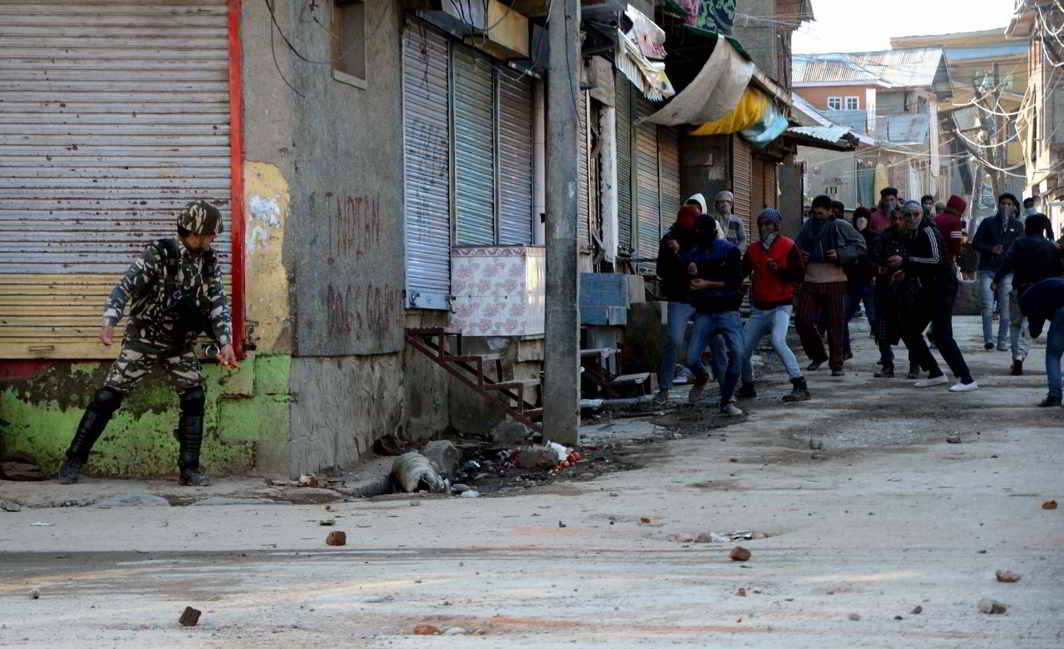
Don’t typecast nationalism by reading it with a particular party’s ideology. It is the only spirit that keeps the soldier and the armed forces going.
~By Colonel R Hariharan
I was astounded to see the caption in a recent TV debate: “Stone-pelters versus Nationalists.” It is shocking to see after decades of efforts to establish law and order in Kashmir, made with the blood and sweat of security forces and policemen, stone-pelters conditioning the national discourse on Jammu and Kashmir.
It hurts me to find Modiphobes using the word ‘nationalism’ as though it is a dirty word, the source of all mischief. Because, I am a nationalist and I am not ashamed to say it loudly. Before self-styled neo-liberals jump to troll me, I say I am not going to allow anyone to typecast me as an admirer of Hindutva or gau rakshaks because I call myself a nationalist.
Equally, I am not prepared to allow the hijacking of nationalism by saffron, yellow or red or any other colour, because ‘nationalism’ is non-negotiable. To me, you cannot confine nationalism to ideologies. To me, nationalism is beyond politics. It’s related to my identity, culture and traditions.
In this context, I remember the words of a smuggler we engaged to ferry our source across Barak River into East Pakistan, on the eve of the 1971 war.
When we asked him how much we should pay, he said: “Babu, I am a convicted smuggler. But I am not doing this for money. Remember, smugglers can be patriots because nationalism is in our blood. There is no price for it.”
To men in uniform, it comes with the colour of their uniform and they are ready to pay the price with their lives. This is why my blood boils when I see people, sitting in the cosy, air-conditioned comfort of TV studios, passing value judgement on a Major who adopted the expedience of using one of the stone-pelters as a human shield, to extricate polling officers and policemen from a mob trying to lynch them.
If Akshay Kumar in uniform had done it in a Bollywood movie, the same critics would have applauded him.
But not in real life, when stone-pelters are exercising their “right to lynch” polling officers. Because they feel, nationalism is a sentiment, like any other. To me and millions of other countrymen who had worn the uniform, it is beyond sentiment. It is difficult to digest glib comments made by people, who do not bother to understand either the life and death situation the hapless Major faced or the nuances of operational leadership.
Improvisation is its watchword and goal orientation is the focus of operational leadership. Unless this is understood, it is difficult to grasp the plight of military men face, day in and day out, in fighting insurgents.

We should leave it to the Army to decide the correctness of a military action. Army looks critically at every military action, to correct its methods and improve upon them. It swiftly punishes the guilty or the incompetent. And it does all this silently.
Military operations can be topics of parlour debates. But let us not attach labels like stone-pelters versus nationalists. I will not be surprised if some of the stone-pelters later on become netas. If that is the accepted national norm, so be it; but please leave the armed forces out of it. Leave it to the Army to deal with the aftermath of the ‘human shield’ action.
Don’t equate the Major’s conduct with stone-pelters. He was trying to save lives, while the lynch mob was baying for blood.
The Indian Army has the unenviable record of fighting insurgents for over six decades, perhaps unparalleled in the annals of military history. It has sacrificed thousands of men in these operations. It is perhaps the biggest learning organization, which continuously hones its skills.
Let us not teach the Army how to fight insurgents without getting rid of the way we reduce everything to ‘tu tu, mei mei’ arguments fixated on our ideologies.
Even after 25 years of my retirement from the Army, when I see an Army man brought in a coffin wrapped in the tricolour, it brings a lump to my throat, because he died to keep me and all others alive.
Once again I say I am a nationalist, like two million men in uniform, who do the thankless job of saving scores of lives, including the stone-pelters and armchair critics. For the good of the country, have faith in the security forces and allow them to do the job. Let us not trivialise them.
Otherwise, withdraw the forces from Jammu and Kashmir. If you have the courage of conviction to face the mob trying to lynch you, then hold a political discourse. I am yet to see a single political party trying to evolve a national consensus on Jammu and Kashmir, because that is the way we do politics in this country – whipping the fall guys.
Please don’t do it with the armed forces, because when you are the fall guy, they may not be there to save you.
—Col R Hariharan, a retired Military Intelligence specialist on South Asia,
has rich experience in terrorism and insurgency operations

